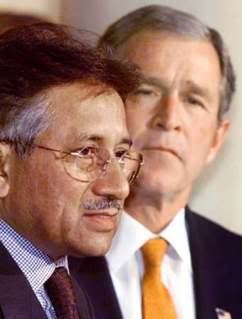[snip]Since September 11, 2001, the U.S.'s Pakistan policy can be summed up in two words: Pervez Musharraf. But within the U.S. intelligence community, and in Pakistan, there's a growing belief that the U.S.-friendly military dictator's days are drawing to a close -- and possibly within the next few months. It may be time for the U.S. to face what it's long feared in the nuclear state: the prospect of chaos, rising Islamism or anti-Americanism that follows Musharraf.
But the hope -- among Pakistani military officers and politicians, to say nothing of U.S. diplomats -- is that the increasingly inept and unpopular Musharraf can be eased out of power while the U.S. slowly distances itself from him, allowing for as smooth a transition as is possible in the turbulent South Asian country. Some see the Pakistani Army remaining powerful enough to prevent a chaotic transition or an Islamist takeover.
Within three months, Musharraf has grown steadily weaker in the eyes of the security services, the Islamists, and the general public, compounding the doubts that some in the U.S. have over his commitment to taking on al-Qaeda. The mistakes expose a regime "imploding" under the weight of its contradictions, according to Grere, and unable to mollify the multifaceted discontent that has taken root since Musharraf seized power in a 1999 coup.
Neither Richer nor Grare believes that there's an obvious candidate to succeed Musharraf, the ex-Pakistani official cited two prominent generals who could emerge as successors if the Army opts to retain formal rule, or alternatively, serve as crucial behind-the-scenes power brokers. The two are Ehsan Saleem Hayat, the army's vice chief of staff, and Ehsan ul-Haq, the chairman of the joint chiefs and a former head of Pakistan's powerful intelligence apparatus, known as the ISI. According to the ex-Pakistani official, both men were recently in Washington, sounding out senior officials: "They didn't come to Washington for a Burger King meal." A State Department official confirms that ul-Haq met in May with Deputy Secretary of State John Negroponte, but could not say the same for Hayat.

No comments:
Post a Comment